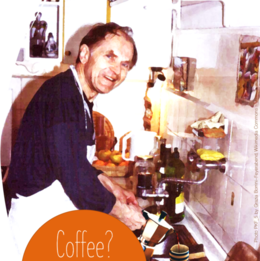Chez Paul

Welcome to Chez Paul, the historico-philosophical café!
 Here, a group of guests, regular and occasional, meets every other month to discuss the development, reflection, and diversification of methods and methodology in science. This series of virtual séances is a continuation of a pre-pandemic series of workshops on the theme “Again, Methods?!” At Chez Paul we subscribe to the framework of integrated History and Philosophy of Science: we are interested in the historical reconstruction of episodes in the history of science and their analysis with the tools of philosophy. The first season is dedicated to examples from the long 19th century, i.e. 1780s to the 1930s.
Here, a group of guests, regular and occasional, meets every other month to discuss the development, reflection, and diversification of methods and methodology in science. This series of virtual séances is a continuation of a pre-pandemic series of workshops on the theme “Again, Methods?!” At Chez Paul we subscribe to the framework of integrated History and Philosophy of Science: we are interested in the historical reconstruction of episodes in the history of science and their analysis with the tools of philosophy. The first season is dedicated to examples from the long 19th century, i.e. 1780s to the 1930s.
Meetings are on Wednesdays, 5.00-6.00 p. m. CET (i.e. 11.00 a. m. - 12.00 p. m. EST). Short 15-minute presentations are followed by ca. 45 minutes of discussion. The model genre is a blog entry rather than a formal paper; the main purpose is to provide the group with thoughts and materials, which will lead to enjoyable and productive discussion.
The café is open to everyone! Please contact K.Nickelsen@lmu.de.
Upcoming events:
 9 June 2021
9 June 2021
John D. Norton (Pittsburgh): How scientists really infer the best explanation
Accounts of inference to the best explanation (IBE) presently in the philosophical literature are obscure and have lost contact with real examples in history of science. Working inductively from canonical examples of IBE in the history of science, I find a different model of the argument form in which a distinctive notion of explanation plays no special role.
My hope is that participants in Chez Paul will find the case interesting in two aspects. First, it provides a well-founded account of what is really happening when IBE is invoked in history of science. Second, it is an illustration of how work in history of science and philosophy of science can be integrated.
For more (and for preparation if you are curious), see Chapters 8 and 9, Inference to the Best Explanation, in The Material Theory of Induction: http://www.pitt.edu/~jdnorton/homepage/cv.html#material_theory“
Previously at Chez Paul:
 14 April 2021
14 April 2021
Dan Liu (Berlin) treated us to a glimpse into the “vacation courses” on scientific microscopy that the Carl Zeiss optical company organised over the years 1907 to 1924. They included lectures, hands-on exercises, and demonstrations of Zeiss’s most advanced microscopes; and according to Dan's reconstruction, were attended by more than 1000 persons from a wide range of backgrounds and professions. We discussed how theory development is entangled with the development of instruments as well as their usage; how the possibility to adjust the microscopic image might relate to the problem of (anti-)realism; and how the practices of looking and observing might help to define more carefully the distinct but related projects of the histories and philosophies of methods and instruments, i.e. microscopy and microscopes.
 17 February 2021
17 February 2021
Hasok Chang (Cambridge, UK) was our next guest of honour. From an analysis of the construction of the Daniell cell in the 1830s, he explained how contingent processes of aim-oriented adjustments of tools and set-ups can lead to the formation of new concepts. Apparently, Daniell’s original aim was not theoretical at all; he simply tried to build a constant and reliable battery, and to this purpose chose to improve some of its predecessors’ features, notably with the help of an ox gullet. The result was not only a much better battery, but also gave rise to key concepts of electrochemistry, such as the redox potential. We discussed the logic of Daniell’s adjustments, the reduction to simple cases, the divergent cultures of textbook writing, and the different meanings of “semi-permeability”.
 16 December 2020
16 December 2020
For our inaugural meeting, Jutta Schickore (Bloomington, Indiana) introduced us to the activity of counter-checking in experiments around 1800. The term was used in a great many different contexts of inquiry at the time, including agriculture, chemistry, veterinary medicine, physiology, and mining, and it is not altogether clear what the term refers to — and where it came from. We discussed the nature and function of these “counter-checks,” or: “Gegenproben,” and tried to connect them to other experimental activities such as controlling.


